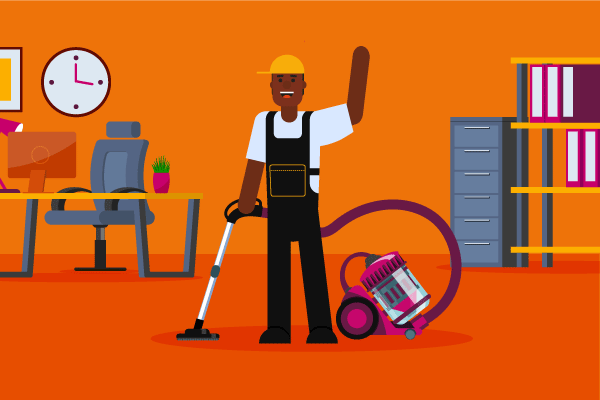
Whether you’re an independent janitor, or run your own janitorial business, you need to protect yourself with insurance.
Janitorial work is risky. Slippery floors, hazardous chemicals and clumsy employees can lead to accidents. And accidents lead to lawsuits.
If a claim goes to court and your business is found at fault, you’ll have to compensate your client for damages and any medical expenses.
That’s on top of paying for your own court costs and legal defense. All of which can drain your bank account and damage your business.
Don’t get taken to the cleaners
Having janitorial business insurance means you won’t get taken to the cleaners if you’re hit with a claim. The average settlement for a slip and fall claim is between $15,000 and $45,000, but they can cost a lot more. Especially as hiring a legal attorney is likely to cost you around $50,000.
Working uninsured as a janitor just isn’t worth the risk. Especially when you can go online and buy all the insurance you need in minutes.
What insurance policies do janitors need?
This depends on who you work for, how many people you employ and how you run your business.
Some clients expect you to have certain types of insurance (and a certificate to prove it) before you work for them. So it’s worth checking your contracts.
As a guide, most janitors need:
• General liability insurance
• Professional liability insurance
• Workers’ compensation (if you employ anyone).
Depending on whether you have a website and use e-mail, you might also want cyber insurance.
General liability insurance for janitors
The most common claims for janitorial businesses are for slips, trips and falls. Because of this, general liability insurance is essential.
It’s for when someone accuses you – or one of your employees – of property damage or bodily injury, whether on your client’s premises or in transit. And as long as an injury isn’t related to your services.
General liability insurance also covers your business for personal injury like slander and libel and for advertising injury.
Claims examples:
An office worker slips on a freshly mopped floor, breaking her wrist. You hadn’t put warning signs up and your client takes you to court, where you’re found liable for her medical expenses.
You accidentally knock a large bottle of cleaning agent over someone’s laptop. Your client asks you pay $900 to replace it with a new one.
One of your employees is overheard making false and unflattering comments about your client while on his lunch break. The rumours reach your client and he sues you for slander.
A competing janitorial business notices your billboards are similar to an advertising campaign they’d run last year. They sue you for copyright infringement.
Professional liability insurance for janitors
Professional liability insurance covers you for damages resulting from errors and omissions. This could be because of a mistake you’ve made or something you’ve failed to do. At any rate, something that’s cost your client money.
Negligence claims can’t be ignored, even if you think you’re not at fault. You could end up with a default judgement. And that means you’ll have to pay whatever your client says you owe.
A claim might result from a janitor using the wrong type of chemical on a marble floor by mistake and causing damage to the floor.
Assuming you’re insured, your insurer pays for the floor to be repaired or replaced, as well as covering your legal fees resulting from a couple of days in court.
Workers’ compensation insurance
If you work solely on your own, then you can forget this one. But if you have employees, either permanent or temporary, then you need janitors’ workers’ compensation insurance. It’s legally required in most states.
Workers’ compensation is a legal right and the penalties for not having insurance can be severe. So it’s worth looking up your state’s individual requirements.
It’s a useful insurance policy because everyone benefits from it. If one of your staff is hurt or falls ill as a result of working for you, they know their medical bills and missed wages are covered. If you’re sued by your employee, you know your legal and court costs are paid for.
While it’s tempting to assume you’re on the right foot with your employees and they wouldn’t ever sue you, this sort of thing is increasingly common. It’s worth protecting yourself where you can.
Do I need insurance if I work for a janitorial company?
As an employee, you’re probably already covered by your boss’s insurance. But it’s worth checking the details of what you’re covered for.
If you use your own cleaning equipment on jobs, you might want to check it’s covered by your employer. Otherwise, you’ll need to get your own BPP policy.
Buy janitorial business insurance online in minutes
You can choose to mix and match policies or buy a janitorial insurance package that includes the main ones you need. It’s completely up to you.
Start by getting a quote online. Or, you can call us on 9778.344.4215 to talk it through.
